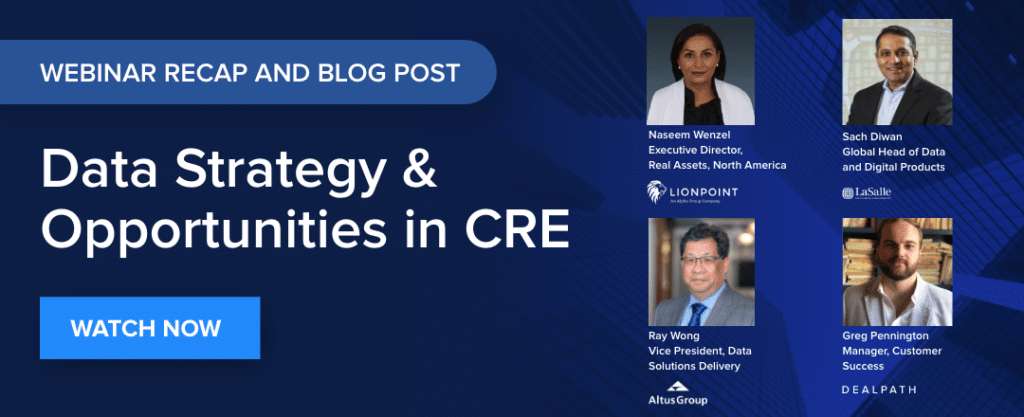Every investment should be guided by data, but is the data you rely on to deploy millions in capital accurate? Dirty data, or inaccurate reporting stemming from miskeyed information and technology inconsistencies, has plagued the commercial real estate industry for decades. A Gartner study showed that bad data can cost companies 15% of their revenue, while almost ⅓ of analysts spend over 40% of their time validating data. But, new solutions that are purpose-built for real estate investors have overcome this obstacle by standardizing and automating data streams.
Read on to learn how your firm can confidently surface the most profitable opportunities by overcoming dirty data with a deal management solution.
The Problem: Dirty Data Clouds Decision-Making & Reduces Confidence
Investment teams are constantly aggregating data on past, current and potential future investments–from rent rolls, to projected IRR and everything in between. That data proves vital when validating investment decisions months or years down the line. All too often, though, even one inaccurate data point can corrupt your firm’s reporting, introducing uncertainty around the integrity of future investment decisions.
Dirty data does not result from one root cause. Across the deal lifecycle, the manual flow of data and information create inaccuracies and gaps in numerous ways:
- Manual data entry: Even the most careful and diligent analysts and associates are bound to incorrectly transcribe or transfer data.
- Inconsistent data formatting: Relying on multiple systems to track investment deal information can prove error-prone, particularly when they do not integrate with each other.
- Failure to enter data altogether: High volumes of manual data entry and reporting requests can cause some team members to overlook data entry requirements.
- Process execution: Loosely defined or undocumented processes can create inconsistencies in the way your team collects and transcribes data. For example, even minor variations in spelling can present complications when aggregating and reporting on data.
- Evolving processes: Are new, refined processes skewing reporting logic pulling data from spreadsheets storing data in various formats?
- Lack of permission control: When spreadsheet or system update access is either wide open or closed off, updates are both error-prone and inefficient.
Dirty Data Misleads Investors, Legal and Others Toward Skewed Decisions
Unfortunately, even slight spreadsheet inaccuracies can spell disaster when there are millions in capital at stake.
Throughout your organization, dirty data can reduce decision-making integrity. From rent rolls, to underwriting models, comps and other internal records, inaccurate data can contaminate investment, portfolio and asset management decisions. These inaccuracies can also pollute documentation collected throughout the asset lifecycle, complicating legal processes downstream.
Eliminating Dirty Data: 5 Ways Deal Management Platforms Elevate Decision-Making Integrity
In today’s market environment, deal management software solutions like Dealpath have empowered firms to regain that integrity in a number of ways, creating clarity and decision-making integrity.
Adopting a deal management platform as an investment command center allows your firm to centralize mission-critical data and information throughout the asset lifecycle.
1. Work with a Vetted, Trusted Data Service to Ingest Accurate Information at the Top of the Funnel
The only way to eliminate the threat of miskeyed information is selecting a solution provider that offers a proven data service. For example, Dealpath Data Ingestion is a trusted, vetted service that extracts and ingests deals from investment OMs and CIMs.
Once dirty data enters your firm’s reporting infrastructure, you need to identify and correct it before it impacts mission-critical decisions. Delegating this time-consuming work to a trusted partner not only eliminates manual data entry and boosts efficiency, but also prevents the risk of record pollution. For example, can you trust underwriting models when rent rolls were incorrectly inputted?
Solving this problem at the top of the funnel positions your firm to make well-informed decisions throughout the asset lifecycle.
2. Creating a Single, Centralized Source of Truth Across the Organization
How can you act with greater conviction when data is dispersed throughout systems? Throughout the investment lifecycle, deal management software acts as an essential source of truth that your team can trust. Standardizing and centralizing this data early on in the investment lifecycle gives your firm the critical opportunity to act on that data.
When this information lives in one place, everyone from the deal team, downstream functions like the asset management team and even key stakeholders can rely on accurate data from a single source of truth.
3. Marrying Data Streams Through an Open API Tech Stack
Sourcing new opportunities is only the beginning. To create optimal data integrity, your firm needs the ability to push data between systems as deals move from your pipeline to your portfolio, and beyond. Not all platforms, however, are designed with this compatibility in mind.
Platforms like Dealpath with an open API can be integrated to ensure a seamless flow of data and information. As properties meet specified conditions, data can be programmatically pushed from one platform to another.
Connecting your tech stack brings consistency to data formats and values, from ERP and accounting systems to leasing platforms and beyond.
4. Drive Adoption With Process and Technology Simplicity
Change management can be challenging, but adopting an easy-to-use platform reduces much of this friction. Software solutions that offer clear visibility, intuitive workflows and streamlined reporting are more likely to be adopted following implementation. Consequently, deal teams will build a culture of more diligent rigor around data hygiene and integrity.
5. Granular Access Controls & Approval Workflows
Rather than open or restricted access, your firm needs a deal management platform with granular access controls that permit them to take action based on their role and responsibilities. For example, while analysts need the ability to add models early on, they may not need the ability to move a deal to diligence. Precise control over which team members can and cannot edit vital information adds much-needed governance.
Similarly, changes must be carefully audited to detect erroneous activity on mission-critical data. Task approval workflows in Dealpath ensure that deal team leaders have visibility into changes that could potentially skew decisions, particularly for late-stage deals.
Mastering The “Open Ecosystem” Of Real Estate Technology
Every data point your firm collects is valuable intelligence for stakeholders across the organization. Download our white paper to learn about the ever-evolving real estate technology landscape, as well as the compounding value of connecting solutions across your tech stack.
Download Now




